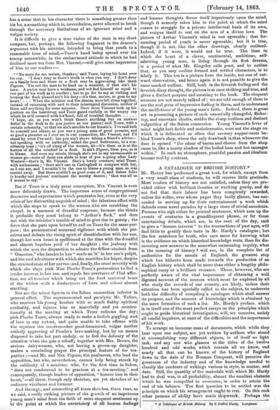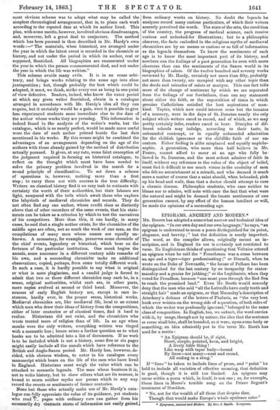A CATALOGUE OF BRITISH HISTORY.*
Mr. HARDY has performed a great task, for which, except from a very small class of students, he will receive little gratitude. Most readers of history are not satisfied, unless they are pro- vided either with brilliant theories or exciting gossip, and do not feel that their labour has been completely rewarded, unless the writer, over whose pages they lazily glance, has suc- ceeded in serving up for their entertainment a work which defends some novel paradox by a large store of trivial anecdotes. Persons who sigh either for pointed sentences, which sum up the events of centuries in a grandiloquent phrase, or for those entertaining details, which are, in the cant of the day, said to give a "human interest " to the transactions of past ages, will find little to gratify their taste in Mr. Hardy's catalogue ; but the few searchers for truth, who care more for knowing what is the evidence on which historical knowledge rests, than for dis- covering new answers to the somewhat unmeaning inquiry, what is the meaning of history ? will see, in the complete list of authorities for the annals of England, the greatest step which has hitherto been made towards the production of an English history which shall be more than either a lengthy philo- sophical essay or a brilliant romance. Those, however, who are perfectly aware of the vital importance of obtaining a well digested account of the sources which must be explored by all who study the records of our country, are likely, unless their attention has been specially called to the subject, to underrate both the difficulty of compiling-a catalogue which shall answer its purpose, and the amount of knowledge which is obtained by the mere formation of such a list. Mr. Hardy's preface, which is in itself one of the most perfect essays on the principles which ought to guide historical investigation, will, we conceive, satisfy all candid inquirers, at once of the difficulties and the importance of his work.
To arrange an immense mass of documents, which while they bear upon one subject, are yet written by authors who aimed at accomplishing very different objects, is of itself no light task, and any one who glances at the titles of the twelve hundred and odd works, which contain all we know, and nearly all that can be known of the history of England down to the date of the Norman Conquest, will perceive the greatness of the industry and of the knowledge needed to classify the contents of writings various in style, in matter, and date. Still, the quantity of the materials with which Mr. Hardy had to deal was, in all probability, almost the smallest obstacle which he was compelled to overcome, in order to attain the end of his labours. The first question to be settled was the principle on which his arrangement ought to rest. On this rock other persons of ability have made shipwreck. Perhaps the
tataloyue if British History. By Ti Duni* liardp Longmaoi
most obvious scheme was to adopt what may be called the simplest chronological arrangement, that is, to place each work according to the reputed date at which its author lived. This plan, with some merits, however, involved obvious disadvantages, and, moreover, left a great deal to conjecture. The method which has been pursued is thus described in Mr. Hardy's own words :—" The materials, when historical, are arranged under the year in which the latest event is recorded in the chronicle or history, and not under the period in which its author, real or supposed, flourished. All biographies are enumerated under the year in which the person commemorated died, and not under the year in which the life was written."
This scheme avoids many evils. It is in no sense arbi- trary, and brings works relating to the same age into close juxtaposition ; but, though probably the best which could be adopted, it must, we think, strike every one as being in one point of view defective. Readers, indeed, who know the exact period at which any given writer flourished, obtain in a catalogue arranged in accordance with Mr. Hardy's idea all they can require, but it certainly would be a gain, were it possible to give less experienced students some immediate clue to the date of the author whose works they are perusing. This information is indeed found in the analysis of the writer's works, but the catalogue, which is so nearly perfect, would be made more useful were the date of each author printed beside the last date mentioned in his works. By this means might be combined the advantages of an arrangement depending on the age of the authors with those already gained by the method of distribution actually pursued. It gives, at any rate, some faint conception of the judgment required in forming an historical catalogue, to reflect on the thought which must have been needed to solve the primary problem involved in the search for a sound principle of classification. To set down a scheme of operations is, however, nothing more than a first step ; to carry them out with success is the true difficulty. Writers on classical history find it no easy task to estimate with certainty the worth of their authorities, but their labours are light, compared with the tolls which await those who explore the labyrinth of medieval chronicles and records. They do not often find any one author, whose credit rises so distinctly above that of other recorders of the same events, that his state- ments can be taken as a criterion by which to test the narratives of his competitors. More than this, it can hardly, in many cases, be said that a single author exists, for the chronicles of the middle ages are often, not so much the work of one man, as the compilations of many men whose names are equally un- known. A monastery, for example, preserves some chronicle of the chief events, legendary or historical, which bear on the fortunes of the particular institution. One monk begins the annals, some successor in a different century adds remarks of his own, and a succeeding chronicler tacks on additional observations, copied, perhaps, from some totally different work. In such a case, it is hardly possible to say what is original or what is mere plagiarism, and a candid judge is forced to admit that two or three different chronicles may each be, in a sense, original authorities, whilst each are, in other parts, mere copies evolved at second or third hand. Moreover, the sources of early English history are, except in rare in- stances, hardly ever, in the proper sense, historical works. Medieval chronicles are, like medieval life, local to an extent which men who draw their ideas of history from the compositions, either of later centuries or of classical times, find it hard to realize. Historians did not exist, and the chroniclers who wrote treated more of religion than of life. In an age when monks were the only writers, everything written was tinged with a monastic hue ; hence arises a further question as to what books are to be admitted into a list of documents. If no work is to be included which is not a history, some five or six pages might easily include all the annals which have reference to the British and Anglo-Saxon period. Mr. Hardy has, however, de- cided, with obvious wisdom, to enter in his catalogue every manuscript which bears on the life of the men who have lived in England. Historians must weigh the value which can be attached to monastic legends. The man whose business it is, not to write history, but to show others what are its sources, is bound to scorn neither myths nor poems which in any way record the events or sentiments of former centuries.
None but those who actually make use of Mr. Hardy's cata- logue can tlly appreciate the value of its guidance, yet students who read pages with ordinary care can gather from his necessarily drY abstracts stores of information not easily gained from ordinary works on history. No doubt the legends he analyzes record many curious particulars, of which their writers scarcely perceived the worth. The state of the arts, the condition of the country, the progress of medical science, each receive curious and unlooked-for illustrations ; but to a philosophic observer, the facts embodied in the religious myths of medieval chroniclers are by no means so curious or so full of information as the legends themselves. To know the sentiments of each age is to know the most important part of its history, and nowhere can the feelings of a past generation be seen with more clearness than can the sentiments of the Saxon world in its biographies of saints. Of the twelve hundred and seventy works reviewed by Mr. Hardy, certainly not more than fifty, probably not more than twenty, are occupied with any other topic than the deeds and miracles of saints or martyrs. This one fact tells more of the change of sentiment by which we are separated from the feelings of our forefathers, than can any statement about either the faith, or the superstition of times in which genuine Catholicism satisfied the best aspirations of man- kind. Topics, which now could interest none but the inmates of a nunnery, were in the days of St. Dunstan nearly the only subject which writers cared to record, and of which, as we may pretty certainly infer, readers cared to hear. Disciples of dif- ferent schools may indulge, according to their taste, in unbounded contempt, or in equally unbounded admiration for the childish ignorance or the childlike faith of our an- cestors. Either feeling is alike misplaced and equally unphilo- sophic. A generation, who more than half believe in Mr. Foster, cannot afford to sneer at an age who fully be lieved in St. Dunstan, and the most ardent admirer of faith in itself, without any reference to the value of the object of belief, must find it difficult to see much virtue in the credulity of men who felt no astonishment at a miracle, and who deemed it much more a matter of course that a saint should, when beheaded, pick up his head and walk, than that a doctor should attempt to cure a chronic disease. Philosophic students, who care neither to blame nor to admire, will note with care the fact that what were the natural and might be deemed the innate sentiments of one generation cannot, by any effort of the human intellect or will, be made the opinions of a succeeding age.































 Previous page
Previous page